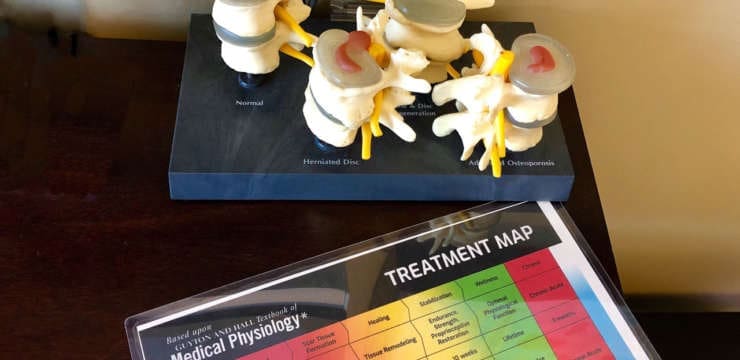Many doctors/surgeons rely on the widely adopted lumbar spinal fusion. However, experts have asserted that lumbar total disc replacement or TDR should be made available…


Many doctors/surgeons rely on the widely adopted lumbar spinal fusion. However, experts have asserted that lumbar total disc replacement or TDR should be made available…

Although it is not officially summer, the past few weeks sure feels like it. Especially for those with joint discomfort and pain. As the body…

A proper diagnosis goes a long way. Treatment and recovery can happen relatively quickly or broken up into parts, phases, and sessions, as part of…

Muscle cramps are sudden and involuntary contractions of one or more of the body’s muscles. They often occur at night or at any moment stopped…

Vitamin B12 and Shoulder Injuries. Most shoulder injuries involve the muscles, ligaments, and tendons. Individuals that perform repetitive arm motions/movements, constantly lift objects as part…

Knee Injuries, Surgeries, and Vitamin D Status. The knee joint is one of the largest and complex joints. It connects the thigh bone to the shinbone,…

There are different types of muscle from a biological perspective, however, there is no such thing as lean muscle. Lean suggests the absence of body…

When it comes to Neuromusculoskeletal disorders, many techniques are available for one to learn. Some of these techniques include:Â
Activator methodsÂ
Applied Kinesiology
Atlas SpecificÂ
Meric SystemÂ
Network ChiropracticÂ
Pro-AdjusterÂ
And Many MoreÂ
As a healthcare practitioner, upwards of 90% of your consultations involve a clinical investigation. The most often asked questions to patients include “How long have you had the pain?†and “What aggravates the pain?†However, it is imperative to determine the best course of treatment for patients. To properly do this, you do a functional history that includes all dimensions of wellness, not just physical and pain. These questions include:Â
Past Medical HistoryÂ
Occupational StatusÂ
Social StatusÂ
Medication HistoryÂ
Surgical HistoryÂ
Identifying non-neuro muscular disorders the patient may have like diabetes, fibromyalgia, rheumatoid arthritis, and cancerÂ
Understanding all areas of injury is vital due to neurological referred pain. Neurological referred pain occurs when signals get mixed in your neurological wiring. Sensory inputs from different areas of the body combine into single neurons (the nerve cells) in the spine. In the spine, they are integrated and modified before being sent to the brain. To properly assess and have successful treatment, one must identify the proper tissue that has been compromised.Â
Along with this, there are perpetuating factors that can lead to downfalls as well.Â
Mechanical Stresses
The stresses that directly impact pain and the skeletal system include short leg, hemipelvis, long second metatarsal, short upper arms, postural stresses, misfitting furniture, poor postures, abuse of muscles, and immobility.Â
Short leg is seen frequently and puts a biomechanical strain on the supporting muscle. This creates a distortion of axial alignment. The main muscle impacted is the quadratus lumborum. This muscle being compromised is one of the most overlooked sources of low back pain. Once this is identified, the shoulder girdle should be evaluated next. If individuals are suffering from low back pain frequently, nutritional inadequacies should be considered.Â
There are research studies done showing nutritional deficiencies to be associated with chronic neuromusculoskeletal system disorders. For optimal health, we focus on the body down to the orthomolecular components. These include:Â
B1
B6
B12
Folic Acid
Vitamin C
CalciumÂ
PotassiumÂ
IronÂ
MagnesiumÂ
InBody
Part of obtaining a full history is having patients undergo an InBody scan. This scan focuses on body composition and inflammation. It provides a full report of water, percent body fat, phase angle, visceral fat, basal metabolic rate, ECW/TBW and contains multiple segmental analysis sections. The InBody 770 high power technology to accurately assess patients.
[embedyt] www.youtube.com/watch?v=WwbIsPNUYqs%5B/embedyt%5D
Â
THE HUMAN BODY IS VASTLY INTERTWINED AND HEALTH CARE PROVIDERS SHOULD BE LOOKING AT EVERY AREA IF YOU ARE EXPERIENCING PAIN OR DISCOMFORT. A DETAILED HISTORY CAN HELP DOCTORS GET TO THE ROOT SOURCE OF YOUR PAIN. -KENNA VAUGHN, ACSM-EP, SENIOR HEALTH COACHÂ
References:Â
Dr Ron Grisanti,D.C “Insiders Guide.†Functional Medicine University (FMU).Â
Williams FH. Neuromuscular complications of nutritional deficiencies. Phys Med Rehabil Clin N Am. 2008 Feb;19(1):125-48, vii. doi: 10.1016/j.pmr.2007.10.006. PMID: 18194754. Â
Additional Online Links & Resources (Available 24/7)


Â
Online Appointments or Consultations:  https://bit.ly/Book-Online-Appointment


Â
Online Physical Injury / Accident Intake Form: bit.ly/Fill-Out-Your-Online-History


Â
Online Functional Medicine Assessment: bit.ly/functionmed
Â
Â
Disclaimer
Â
The information herein is not intended to replace a one-on-one relationship with a qualified health care professional, licensed physician, and is not medical advice. We encourage you to make your own health care decisions based on your research and partnership with a qualified health care professional. Our information scope is limited to chiropractic, musculoskeletal, physical medicines, wellness, sensitive health issues, functional medicine articles, topics, and discussions. We provide and present clinical collaboration with specialists from a wide array of disciplines. Each specialist is governed by their professional scope of practice and their jurisdiction of licensure. We use functional health & wellness protocols to treat and support care for the musculoskeletal system’s injuries or disorders. Our videos, posts, topics, subjects, and insights cover clinical matters, issues, and topics that relate and support, directly or indirectly, our clinical scope of practice.* Our office has made a reasonable attempt to provide supportive citations and has identified the relevant research study or studies supporting our posts. We provide copies of supporting research studies available to regulatory boards and the public upon request. We understand that we cover matters that require an additional explanation of how it may assist in a particular care plan or treatment protocol; therefore, to further discuss the subject matter above, please feel free to ask Dr. Alex Jimenez or contact us at 915-850-0900.  Read More…
Dr. Alex Jimenez DC, MSACP, CCST, IFMCP*, CIFM*, CTG*
email: coach@elpasofunctionalmedicine.com
phone: 915-850-0900
Licensed in Texas & New Mexico

Tennis is an intense sport that requires strength, agility, flexibility, stamina, endurance, and conditioning. And it’s a great way to stay in shape. However, with…

With the number of individuals/vehicles on the road today, automobile accidents are frequent and even minor ones can cause damage. The most obvious is the…

Individuals typically don’t think about their spine as they go through their everyday lives, bending, reaching, twisting, lifting, etc. However, it is through all of…

Here are a few recommended stretches and exercises for relieving herniated disc symptoms. The vertebrae are the small bones that make up the spine. They…

Baastrup’s syndrome is named after Christian Ingerslev Baastrup. He discovered and described the condition in 1933. In this syndrome, pain and inflammation are triggered when…

Stress can be defined as any external or internal challenge that disrupts homeostasis in an individual. How stressed an individual feels varies depending on their coping skills and mechanisms. For most, stress is anything that causes a flight or flight response. There are several emotions that cause individuals to feel this flight or fight response. A few possibilities are:
Bitterness
Resentment
Retaliation
Anger
Trauma
Betrayal
Rage
DepressionÂ
GossipÂ
Self-hate
Being rejectedÂ
LonelinessÂ
ShameÂ
A stressor produces different mixes of the nervous system and hormonal responses. One stressor may lead to the nervous system activation releasing catecholamines, but small amounts of adrenaline and cortisol. However, another stressor may result in the opposite reaction. In studies performed, it is stated that there are direct relationships between behavior, the brain, and immunity. One association that is well studied is the relationship between autoimmune diseases and self-hatred. By attacking ourselves with our own harsh words and negative thoughts, we see a direct relationship corresponding to an autoimmune response, ultimately ending in autoimmune disease. The study can be viewed below:
Dangers of Excessive CortisolÂ
Cortisol is released in times of stress. It is necessary, but when too much cortisol is released for too long, the body sees side effects. The adrenal glands are consistently producing cortisol. Cortisol stimulates the conversion of noradrenaline to adrenaline. This creates an increased amount of adrenaline in the blood. Cortisol also blocks the conversion of the T4 thyroid hormone. Due to this, individuals under stress may develop systems of hypothyroidism. Additionally, cortisol suppresses the production of T-cell activity. This increases the risk of infection.Â
Another study states that animals genetically susceptible to insulin-dependent diabetes (Type 1 Diabetes) developed the disease more frequently when they were subjected to stress. While under stress, the elevated cortisol levels in the bloodstream block insulin, making it difficult to control blood glucose. Â
Phase AngleÂ
Stress plays an essential factor in phase angle as it disrupts homeostasis. The phase angle is a snapshot at cellular health that provides practitioners with the integrity of your cellular membranes. The healthier an individual is, the higher their phase angle, making it harder for inflammation and infection to infiltrate. The more stress an individual is under, the higher their cortisol is. This increases their blood glucose level and can result in a higher body fat percentage. These combined decrease cellular health and cause a permeable cellular membrane. We evaluate and monitor our patient’s phase angle by using an InBody 770 machine. The anthropometric measurements show us where inflammation is and other significant numbers such as visceral fat, basal metabolic rate, and segmental water analysis.Â
[embedyt] www.youtube.com/watch?v=WwbIsPNUYqs%5B/embedyt%5D
Diagnostic TestingÂ
Although we utilize many different diagnostic lab companies, we use the Adrenal Hormone Report from Doctors Data to measure cortisol levels. A sample report is shown below:Â
Â
Â
CORTISOL IS NECESSARY, AND STRESS IS A NATURAL RESPONSE TO PROTECT THE BODY. HOWEVER, WHEN WE SEE THE “STRESS RESPONSE” ON FOR TOO LONG, WE KNOW OTHER ISSUES ARE GOING ON. IT IS CRUCIAL TO REMEMBER TO RELAX, TAKE TIME TO FOCUS ON DEEP BREATHING, MEDITATION OR YOGA, AND UNWIND. -KENNA VAUGHN, ACSM-CEP, SENIOR HEALTH COACHÂ
References:Â
Maier SF, Watkins LR, Fleshner M. Psychoneuroimmunology. The interface between behavior, brain, and immunity. Am Psychol. 1994 Dec;49(12):1004-17. doi: 10.1037//0003-066x.49.12.1004. PMID: 7818221.Â
Dr Ron Grisanti,D.C “Insiders Guide.†Functional Medicine University (FMU).
Additional Online Links & Resources (Available 24/7)


Â
Online Appointments or Consultations:  https://bit.ly/Book-Online-Appointment


Â
Online Physical Injury / Accident Intake Form: bit.ly/Fill-Out-Your-Online-History


Â
Online Functional Medicine Assessment: bit.ly/functionmed
Â
Â
Â
Disclaimer
Â
The information herein is not intended to replace a one-on-one relationship with a qualified health care professional, licensed physician, and is not medical advice. We encourage you to make your own health care decisions based on your research and partnership with a qualified health care professional. Our information scope is limited to chiropractic, musculoskeletal, physical medicines, wellness, sensitive health issues, functional medicine articles, topics, and discussions. We provide and present clinical collaboration with specialists from a wide array of disciplines. Each specialist is governed by their professional scope of practice and their jurisdiction of licensure. We use functional health & wellness protocols to treat and support care for the musculoskeletal system’s injuries or disorders. Our videos, posts, topics, subjects, and insights cover clinical matters, issues, and topics that relate and support, directly or indirectly, our clinical scope of practice.* Our office has made a reasonable attempt to provide supportive citations and has identified the relevant research study or studies supporting our posts. We provide copies of supporting research studies available to regulatory boards and the public upon request. We understand that we cover matters that require an additional explanation of how it may assist in a particular care plan or treatment protocol; therefore, to further discuss the subject matter above, please feel free to ask Dr. Alex Jimenez or contact us at 915-850-0900.  Read More…
Dr. Alex Jimenez DC, MSACP, CCST, IFMCP*, CIFM*, CTG*
email: coach@elpasofunctionalmedicine.com
phone: 915-850-0900
Licensed in Texas & New Mexico

Improper posture affects the whole body and can lead to various pain issues throughout the body. Correcting posture is recommended before trying to correct it…

Learning how to manage and combat insomnia. Being wide awake early in the morning, trying hard to fall back to sleep before the alarm goes…

Hormones are responsible for many functions throughout the body. The body depends on these levels to be stable and released at the proper time. For…